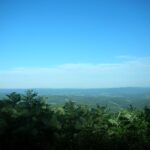Recently, our druid grove brought John Michael Greer to Michigan, where he did a book signing and gave a talk on the fall of industrial civilization. If you are interested in either druidry or sustainability, John Michael’s works (on druidry, esoteri wisdom, and peak oil) are some of the very best you can read (and I’ve recommended some of them before on this blog). I should also add that beyond his books on peak oil, you can read his blog, the Archdruid Report.
I wanted to spend a little bit of time today outlining some of his major arguments on Peak Oil/Industrial Decline, posting the video from his community lecture he gave in Detroit, and providing a personal response. While the arguments and information that John Michael presents are not easy messages for anyone in the industrialized world to hear, they are necessary discussions that need to take place.
Video of John Michael Greer’s Community Lecture in Detroit: “Not the Future We Ordered.”
[youtube=http://www.youtube.com/watch?v=KDSTK3a_q9k]
This is about the first hour and 15 minutes of his talk, which includes a few Q&A questions (but the discussion continued long after my memory card ran out of space!)
Overview of JMG’s Talk – Peak Oil and Industrial Decline. In a nutshell, John Michael presents evidence and research through his books, blog, and talk that indicates that the world is running out of fossil fuels (our cheapest and most abundant energy supply in human history) and that this will invariably put our modern industrial society into decline. This decline will not be quick, but rather will likely take the path of most societies in the past—what Greer calls a “long descent” over a period of centuries, with smaller crises and upswings, but a general downward pattern.
As Greer demonstrates, back in the 1950’s, Hubbert (a geologist who worked for Shell Oil) demonstrated that oil production in an individual field works a lot like a statistical bell curve due to geology—the oil, which can only be pumped out of the ground so quickly—comes out more and more quickly until it reaches its peak, then it slowly declines in production until there is no oil left. Hubbert’s argument (which was proven right in the 1970’s) suggested that just like an individual oil field, the US oil production would reach a peak and then decline. And that’s exactly what happened in the 1970’s. In the 1970’s, Hubbert’s data also indicated that there would be a global peak in oil production (as we do live on a planet with finite resources, a fact that much of industrial society seems to have forgotten). Most researchers who are studying peak oil agree that we’ve already reached our peak of production (somewhere around 2005).
Industrial society, built upon cheap oil, cannot be sustained at its current rate of consumption nor standard of living without the influx of said cheap oil. Since the world has reached its peak already in 2005, we will continue to see oil prices skyrocket. We’ll also continue to see our government’s ability to provide for its citizens, and people, over time, will be forced to provide for more of their own needs, grow their own food, and learn to live and make do with less. We also see, as John Michael argues in his new book Not the Future We Ordered, industrial society sticking its head in the sand and working hard to ignore the problem, because the idea that progress will happen no matter what (the “myth of progress” as JMG calls it) is our “civic religion.” This means that people believe in progress so strongly, they hold onto this like a kind of religious belief, and no amount of evidence to the contrary will dissuade them.
One more important thing—civilizations don’t rise or fall within a day. Charting human history, John Michael suggests in the Long Descent that this fall of industrial civilization will take time, likely several centuries. We are seeing the start of it now—walk around New Orleans or Detroit and you’ll see the crumbling buildings, the areas that have already been abandoned. In Detroit, however, you’ll also see a thriving Eastern Market where people are shifting to local eating, using pedal power to deliver vegetables, putting up hoop houses, and converting abandoned lots into vegetable gardens. The future, JMG argues, is here in the rust belt.
Where do druids fit in all of this? From my perspective, if we accept these arguments as valid (and by all means, watch his talk and read his books yourself to make up your own mind), and we want to do something about it, we have a long, hard road before us. Most individuals living in industrial society haven’t yet even considered this as a problem (and you may recall my earlier post on Stasis Theory and before policies can be enacted to facilitate change, we first must agree that there is a problem and that it is serious). I try not to think about the larger forces that are continuing to drive us on as though our limits to growth aren’t quickly approaching, because that mindset depresses and overwhelms me, especially insofar as it demonstrates my own powerlessness on that national/international level. Rather, I think about what I can do, individually and in my local community, that will make a difference. And most importantly–I move from thought to action, to doing things rather than just talking, and its in the act of doing things that I feel empowered.
JMG suggests, and I fully agree, that if we want to enact such change, Druids can have a special place in this transition. As the potential holders of “oak knowledge,” (to reach back to the ancient etymology of the word “druid”), we can think about what the knowledge of the oaks is all about. The ancient druids held oak knowledge, in the sense that the oak tree was rooted in their survival. We can think about what modern “oak” knowledge means–literally, things like how we might use all those lovely acorns that drop each year to the ground to being resources for others who need help. While we still have access to cheap, abundant oil, we can work to reskill, to learn things that will be helpful in the future, and to preserve basic technologies for future generations (like JMG’s suggestions in his talk for HAM radio, wind turbines, basic printing press technology, etc). We can work to make sure that when things really begin to shift, we are mentally, physically, and spiritually prepared to that we can help others (which is the subject of his new book, which I’ll discuss further in an upcoming blog).
And I think that JMG’s arguments and talk further demonstrate why things like reskilling, organic gardening, permaculture, and so forth are so important—its not just about sustainability but about survival in a post-peak oil world.


Going back to the horse and cart won’t be too much of a problem for me.
I think the evidence is lacking the peak oil will end our civilization. In my experience the belief that it will is more of a wish for an imagined pastoral past. Renewable energy sources combined with steadily improving battery technology are well placed take over fossil fuels are they peak. Their share is increasing and approaching parity will fossil fuels.
The problem with renewable energy sources is that their creation is still largely dependent on fossil fuel–think about the large windmills. They are created, shipped, installed, etc. all using fossil fuel. Do you have evidence suggesting the contrary? If so, I’d be very interested in hearing it.
From the Peak Oil community, JMG spends a lot of time discussing this perspective in “The Long Descent” and there are some other really good discussions of this topic, such as James Howard Kunstler’s “Too Much Magic: Wishful Thinking, Technology, and the Fate of the Nation.”
Creating and installing renewables only requires fossil fuels because they currently make up a relativity small share of our energy budget, something like 15% of electricity and much less of transportation. It is reasonable to think that there is no special reason why this must be the case, the windmills don’t care if the energy required to make them came from coal, methane, solar, or thorium.
As energy prices increase more renewables will be installed and the share of renewables as an energy source will increase. Therefore an increasing amount of the energy used to increase the utilization of renewables will come from those renewable sources in a virtuous cycle.
Andrew, thanks for adding your perspective here. I think it’s valuable because it’s instructive—I have heard much the same reasoning often as people grapple with peak oil and by extension the issue of resource limits generally. I think it’s important to point out a couple factors Mr. Greer discusses frequently and eloquently.
One of these factors is energy returned on energy invested. Early in the oil boom, it returned close to 100 times the energy to required for extraction. Having to rely on such as deepwater drilling, fracking, and constant war has driven that return down, but still no other source even comes close. This solar-derived energy was captured by photosynthesis and stored up in petroleum over millions of years. Comparing the EROEI of oil to everything else shows that switching off petroleum must ALSO entail drastically less consumption. Because surplus concentrated energy is the foundation on which the past few centuries of explosive economic growth has rested, peak oil means the end of economic growth and the beginning of a large contraction even though we will rely more on renewables.
The big chore is coming to grips with the end of growth. Because our civilization is deeply predicated on growth, peak oil involves much more than dropping in one energy source to replace another. The extended contraction ahead is going to mangle some of our civilization’s core assumptions. One way or another, we will arrive at a world view coherent with the way things work when a huge energy source isn’t being exploited. There is no other option, in spite of the professional conucopian pundits foolishly insisting otherwise.
About prices going up, I think it’s important to bear in mind that demand is necessary but not sufficient. If people can’t pay higher prices, then prices won’t go up; that only works if overall growth can be taken as a given.
I’m partway through Greer’s 2008 book The Wealth Of Nature, and I can’t recommend it highly enough for anyone who’s ready to step outside the crippling assumptions made by contemporary economics.
I also appreciate the discussion. I am new to Greer’s work and some of these ideas. I don’t have an ideology on these matters, I’m just trying to understand and discuss.
Energy return is certainly an issue that I’ll have to look at more closely with renewable sources. My impression is it is mostly a matter of time scale. There a large upfront investment with a gradual payoff. Over five years the return might not be so good, but over the life of the wind turbine or photovoltaic cell it might be very good. I would say a balance of less consumption(conservation) and more investment.
I see a difference between an end to growth and a decline of industrial civilization. The former is very likely a necessity based on finite natural resources; the latter strikes me as hyperbole.
Clearly supply and demand apply. This will drive both conservation and an increase in supply, this seems like a good thing to me.
This article seems relevant and was interesting to me. http://www.businessinsider.com/the-world-is-not-headed-for-disaster-2013-4